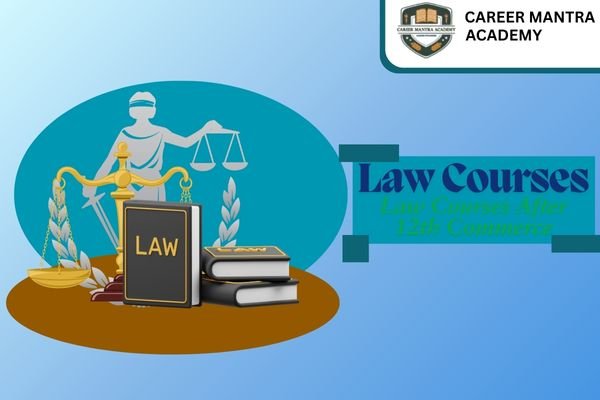
For Applying Law/ Advocate Course Click Here…
Law Courses After 12th Commerce:
Students frequently ponder which career path will provide them with stability, recognition, and growth after completing their 12th-grade commerce coursework. Law courses after 12th commerce stand out as one of the most promising career choices among the many options available. In addition to improving a student’s understanding of legal systems, these courses enable them to integrate their background in commerce with corporate, financial, and business law.
Law is not just court practice anymore. The need for qualified legal professionals is rising quickly in government agencies, corporate firms, and multinational corporations as a result of globalization and growing businesses. Commerce students can gain a solid foundation in business management and legal education through integrated programs such as BA LLB, BBA LLB, and B.Com LLB. They can work in fields like corporate law, tax law, company law, and legal advisory services thanks to this special combination.
After completing 12th grade commerce, pursuing law courses offers additional career flexibility. Graduates can pursue careers in corporate law, advocacy, legal advising, consulting, or even the judicial system. For commerce students seeking a dynamic and fulfilling career, law is quickly rising to the top of the list due to its attractive compensation packages, opportunities for career advancement, and social respect.
What is the eligibility for law courses after 12th?
Students must fulfill specific eligibility requirements set by universities and law entrance exams in order to pursue law courses after completing their 12th grade in commerce. The fundamental prerequisite is earning at least 45–50% of the possible points in any subject, including commerce, after completing 10+2 education from an accredited board. The cut-off percentages for some prestigious law schools might be higher.
Entrance exams such as CLAT, AILET, LSAT, or SLAT are required for admission to the majority of reputable law schools, particularly National Law Universities (NLUs). To be admitted to five-year integrated law programs like BA LLB, BBA LLB, or B.Com LLB, students must pass these tests.
The stream is usually unrestricted; students studying science, commerce, or the arts are all equally eligible. Nonetheless, students who have a background in commerce have an advantage in areas like business law, tax law, and corporate law. Age restrictions may also apply at some universities; for undergraduate law programs, these typically fall between the ages of 20 and 22.
Which are the popular law courses after 12th?
It can be difficult for commerce students to decide on the best career path after high school. Even though many choose more conventional career paths like B.Com., CA, or CS, law has become a strong and fulfilling choice. The fields of corporate law, tax law, and business regulations are made possible by the intersection of law and commerce. After completing their 12th grade in commerce, students who pursue law courses benefit from having a solid understanding of both business and legal frameworks, two things that are highly valued in the cutthroat world of today.
Let’s explore the most popular law courses that commerce students can pursue after their 12th:
1. BA LLB (Bachelor of Arts + Bachelor of Laws)
The five-year BA LLB program combines legal studies with humanities courses. In addition to studying fundamental legal topics like criminal law, contract law, and constitutional law, students also study political science, sociology, economics, and history.
For students who want to comprehend the larger social and political background of law, this course is ideal. Graduates frequently go on to work as judges, litigators, legal advisors, or even in the fields of social justice and public policy. It provides a comprehensive viewpoint for students of commerce, preparing them to become well-rounded professionals in the legal and social sciences.
Career Options: Advocate, Civil Lawyer, Legal Analyst, Judge, Policy Maker.
2. BBA LLB (Bachelor of Business Administration + Bachelor of Laws)
For students interested in corporate law and business management, the BBA LLB program is perfect because it combines business administration and law. Students study business communication, economics, and management principles in addition to topics like company law and constitutional law.
Because it prepares students for legal roles in multinational corporations, law firms, and financial institutions, this course is especially helpful for commerce students. Strong management, negotiating, and analytical abilities are fostered in students and are essential for managing legal issues in the business world.
Career Options: Corporate Lawyer, Legal Advisor, Business Consultant, Compliance Officer.
3. B.Com LLB (Bachelor of Commerce + Bachelor of Laws)
Due to its direct integration of commerce and law, the B.Com LLB is one of the most popular law programs following 12th grade commerce. In addition to corporate law, tax law, and labor law, students study accounting, auditing, business communication, economics, and financial management.
For commerce students who want to focus on areas like corporate law, taxation, and company law, this course is specifically designed for them. Opportunities for graduates are frequently found in tax consulting firms, corporate firms, chartered accountancy offices, and business legal departments.
Career Options: Tax Lawyer, Corporate Legal Advisor, Company Secretary (with additional qualification), Legal Consultant.
4. Diploma Courses in Law
Diploma programs are brief courses that typically last one to two years and are intended for students who wish to specialize in a particular area of law. Diplomas in cyber law, corporate law, business law, international law, or labor law are available to students who have completed their 12th grade in commerce.
These courses are a good choice for students who wish to improve their legal knowledge without committing to a five-year program or who wish to enter the job market quickly, because they are very skill-oriented and practical.
Career Options: Legal Assistant, Compliance Executive, Paralegal, Specialist in chosen field.
5. Certificate Courses in Law
Even shorter than diploma programs, certificate courses typically last six months to a year. They are intended to impart targeted knowledge on particular subjects, such as arbitration law, environmental law, human rights, cybercrime law, or intellectual property rights.
Certificate programs are an excellent way for commerce students to enhance their resumes and develop expertise in specialized legal fields, even though they do not have the same weight as integrated law degrees. In order to improve their abilities while working, many professionals also enroll in these courses.
Career Options: Legal Researcher, Paralegal, NGO Worker, Freelance Legal Consultant (in niche areas).
Which entrance exams are required for law courses after 12th?
After completing their 12th grade in commerce, students must pass national or university-level entrance exams to enroll in law programs. The most well-known is the Common Law Admission Test (CLAT), which is necessary for admission to many prestigious law schools as well as National Law Universities (NLUs). The All India Law Entrance Test (AILET), administered by NLU Delhi, is another important test. Additionally, students can take the Law School Admission Test (LSAT India), which is accepted by a number of private law schools.
Universities such as Symbiosis also administer their own exam, known as the Symbiosis Law Admission Test (SLAT). Separate entrance exams are also administered by some state universities. These exams help students get into integrated programs like BA LLB, BBA LLB, or B.Com LLB by evaluating their logical reasoning, English, current affairs, and legal skills.
How long are law courses after 12th, and what is the syllabus?
Duration of Law Courses After 12th Commerce:
- BA LLB, BBA LLB, B.Com LLB → 5 years (integrated programs).
- Diploma Courses in Law → 1– 2 years (depending on specialization).
- Certificate Courses in Law → 6 months to 1 year.
General Syllabus of 5-Year Integrated Law Courses:
- Foundation Subjects: Political Science, Sociology, Economics, Business Studies.
- Core Law Subjects: Constitutional Law, Criminal Law, Civil Law, Contract Law, Family Law.
- Specialized Areas: Corporate Law, Taxation Law, Intellectual Property Law, Labor Law, Environmental Law.
- Commerce/Management Subjects (for B.Com LLB/BBA LLB): Accounting, Business Communication, Auditing, Financial Management, Business Administration.
- Practical Training: Moot Courts, Legal Aid Clinics, Internships, Research Projects.
The syllabus aims to give students a balanced mix of legal theory, business knowledge, and hands-on experience to prepare them for careers in law and the corporate sector.

What are the career opportunities after law courses for commerce students?
After completing their 12th year of commerce, commerce students who pursue law courses have access to a wide range of fascinating and fulfilling career options. These students are extremely valuable in the corporate, financial, and governmental sectors due to their combination of legal knowledge and commerce expertise. Following their studies in law, commerce students can pursue the following well-known career paths:
1. Corporate Lawyer
Becoming a corporate lawyer is one of the most popular career choices. Business-related legal issues, such as contracts, mergers and acquisitions, corporate governance, and compliance concerns, can be effectively handled by commerce students with a legal background. Corporate lawyers advise businesses on legal frameworks, risk management, and regulatory compliance while working for multinational corporations, law firms, or as independent consultants. Those who finish programs that combine law with business and financial knowledge, such as BBA LLB or B.Com LLB, stand to gain the most from this career. As businesses continue to grow internationally, corporate lawyers are in high demand because their knowledge has a direct impact on company success.
2. Tax Lawyer
Another interesting area for students studying commerce is tax law. Students can counsel individuals and businesses on tax planning, compliance, and dispute resolution by specializing in taxation during or after completing law courses following their 12th commerce degree. Tax attorneys represent clients before tax authorities, assist clients in navigating complicated tax laws, and guarantee legal compliance to prevent fines. For students who like working with numbers, accounting, and finance while putting their legal knowledge to use, this position is perfect. Tax law careers offer stability and steady demand across industries in addition to financial rewards.
3. Legal Advisor
Legal consultants, sometimes referred to as legal advisors, offer advice on a variety of legal matters to individuals, groups, and companies. Law-degreed commerce students are especially well-suited for corporate advisory positions, where they assist businesses in making well-informed choices about investments, contracts, risk management, and regulatory compliance. Legal advisors can work as independent consultants, in-house for businesses, or with law firms. This position offers flexibility, great earning potential, and the chance to work in a variety of industries, but it also requires strong analytical, negotiating, and communication skills.
4. Judicial Services
A career in judicial services, such as becoming a judge, magistrate, or public prosecutor, is another option for commerce students who finish law courses after completing their 12th grade. Passing tests such as the Judicial Service Exam gives access to government legal jobs where people decide civil and criminal cases, interpret the law, and enforce the rule of law. Employment security, prestige, and the chance to significantly influence society are all benefits of a career in judicial services. If students want to focus on related cases in the judiciary, they have an advantage if they have a solid understanding of corporate, civil, or taxation law.
5. Academia and Research
A career in academia is very fulfilling for students who are interested in teaching and research. Law-degree-holding commerce students can work as legal researchers, lecturers, or professors at academic institutions. They might concentrate on international law, taxation law, corporate law, or other specialized areas. Academic careers enable people to publish research papers, take part in policy-making initiatives, and contribute to the advancement of legal education. Careers focused on research can also lead to consulting positions in government agencies, NGOs, and think tanks.
What skills are required to succeed in law courses after 12th?
After completing their 12th grade in commerce, students must possess a variety of analytical, interpersonal, and communication skills in order to succeed in law courses. Understanding intricate legal documents, contracts, and case laws requires strong reading and comprehension skills. Effective legal problem solving, evidence evaluation, and law interpretation are made possible by critical thinking and analytical abilities.
Writing legal documents, making arguments, and negotiating settlements all require effective verbal and written communication skills. In order to succeed in careers in corporate and tax law, commerce students should also possess a foundational understanding of business, finance, and taxation.
Research aptitude, meticulousness, and time management are additional critical abilities, particularly when managing several cases or assignments. Practical skills are further improved by taking part in legal workshops, internships, and moot courts. Gaining these skills guarantees success in professional and academic legal careers.

What is the scope of law courses after 12th?
After 12th grade commerce, the range of law courses is extensive and still growing. Depending on their area of expertise, graduates can work in judicial services, corporate law, tax law, litigation, legal advising, and academia. Legal experts are in high demand in banks, government agencies, law firms, and multinational corporations due to globalization and business expansion.
Law students studying commerce have an advantage in areas such as business regulations, taxation, and corporate governance. Additionally, students can specialize in fields such as international law, intellectual property, and cyber law through short-term diploma and certificate programs. All things considered, pursuing law after commerce is a promising career choice for aspirational students because it provides a variety of opportunities, job stability, and the possibility of high earnings.
Conclusion.
After completing their 12th grade in commerce, students who want a fulfilling and exciting career should consider pursuing law courses. Careers in corporate law, tax law, legal advising, judicial services, and academia are made possible by these courses, which provide the ideal balance of legal knowledge and business expertise. Depending on your interests and objectives, integrated programs such as BA LLB, BBA LLB, and B.Com LLB, in addition to diploma and certificate courses, offer several routes to success.
Commerce students can succeed in the cutthroat legal and business sectors if they have the necessary abilities, real-world experience, and area of specialization. Law is a promising career for aspirational students due to the increasing demand for legal professionals, high earning potential, and job stability. After completing 12th grade commerce, selecting the appropriate legal program guarantees not only career advancement but also a well-respected and influential career in society.
FAQs
Can I study law after 12th commerce?
Yes, you can definitely study law after 12th commerce. Commerce students are eligible for integrated law programs such as BA LLB, BBA LLB, and B.Com LLB, which combine legal education with business or commerce knowledge. Admission is usually through entrance exams like CLAT, AILET, or LSAT, and requires completion of 12th from a recognized board. Pursuing law after commerce opens opportunities in corporate law, tax law, legal advisory, judicial services, and academia, making it a rewarding and versatile career choice.
Which LLB is best for commerce students?
For commerce students, the B.Com LLB is generally considered the best option. It is a 5-year integrated course that combines commerce subjects like accounting, taxation, and business management with core law subjects such as corporate law, contract law, and tax law. This makes it ideal for students interested in corporate law, taxation, finance-related legal careers, or business advisory roles. While BA LLB and BBA LLB are also popular, B.Com LLB aligns closely with a commerce background, giving students an advantage in the corporate and financial legal sectors.
Which subject is best for a lawyer in class 12?
For students aspiring to become lawyers, there is no strict requirement for a specific subject in class 12, but some subjects can give a strong foundation. Commerce students benefit from Accountancy, Business Studies, and Economics, especially if they plan to pursue corporate or tax law. Humanities students gain from Political Science, History, and Sociology, which help with understanding laws, governance, and society. Additionally, English is crucial for developing reading, writing, and communication skills, which are essential for any legal career.
Which law course is best?
The best law course depends on your career goals. For commerce students, B.Com LLB is ideal for corporate and tax law, while BA LLB suits those interested in litigation and public policy. BBA LLB is best for business and corporate-focused legal careers. All offer strong career prospects.
Is commerce good for law?
Yes, commerce is a good stream for law, especially if you are interested in corporate law, taxation, business law, or financial regulations. A commerce background gives you an advantage in understanding business, finance, and accounting concepts, which are highly valuable in legal careers. Combined with law courses, it opens diverse opportunities.
Which law is the highest in demand?
The highest in-demand law fields currently are:
Corporate Law – Advising businesses on contracts, mergers, compliance, and regulations.
Cyber Law – Handling legal issues related to digital technology, data protection, and cybercrime.
Intellectual Property Law – Protecting copyrights, patents, and trademarks.
Tax Law – Specializing in taxation, GST, and financial regulations.
Environmental Law – Advising on regulations and sustainability compliance.
Among these, corporate law and cyber law are especially in high demand due to globalization and the digital economy.
How to become a lawyer after 12th commerce?
1. Complete 12th Commerce – Ensure you pass class 12 from a recognized board.
2. Choose a Law Course – Opt for integrated programs like BA LLB, BBA LLB, or B.Com LLB, which combine law with arts, management, or commerce.
3. Clear Entrance Exams – Appear for exams such as CLAT, AILET, LSAT, or SLAT to secure admission in reputed law colleges.
4. Complete 5-Year Integrated Law Program – Study core law subjects, commerce/business subjects, and gain practical experience through internships and moot courts.
5. Enroll with the Bar Council of India – After graduation, register as an advocate to practice law officially.
6. Specialize (Optional) – Pursue LLM or certifications in areas like corporate law, tax law, or cyber law to enhance career prospects.
What is the full form of LLB?
The full form of LLB is Legum Baccalaureus, which is Latin for Bachelor of Laws. It is an undergraduate law degree that equips students with knowledge of legal systems, statutes, and regulations. LLB graduates can pursue careers as lawyers, legal advisors, corporate counsel, or in judicial services.
